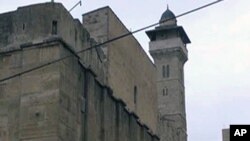The West Bank city of Hebron has long been a flashpoint in the Israeli Palestinian conflict. It is holy to both Muslims and Jews as the site where both traditions say the Biblical Abraham is buried. Plans by Israel to include it in a list of Israeli national heritage sites have touched off clashes and prompted the Palestinian leadership to warn of a new Intifada, or popular uprising. The tensions persist and are overshadowing prospects for new peace negotiations.
To Muslims, it is the Ibrahimi Mosque. To Jews, it is the Cave of the Patriarchs. To both, it is one of their holiest sites.
Recently, anger exploded after Israeli Prime Minister Benjamin Netanyahu added it and Rachel's Tomb near Bethlehem, both on the occupied West Bank, to Israel's list of national heritage sites. The designation will ensure state funding.
"The decision is not a political decision and was not a political statement," Rabbi Daniel Hershkowitz said. Hershkowitz is a member of Mr. Netanyahu's cabinet. He led the call for the decision. "The decision refers more to a line-budget to maintain the places."
Israel seized control of the cave, in Hebron, and Rachel's tomb during the 1967 Arab Israeli war.
Today, there are hundreds of Jewish settlers living in enclaves in Hebron. With no peace agreement between Israel and the Palestinians, the holy sites are on disputed ground.
Hebron's Palestinian residents, like Hussam Abdeen, see the recent move as a further Israeli claim on occupied territory and a provocation. "They want to move all of the Palestinian territories to be on fire, and they are trying to prepare the land for the third Intifada (uprising)," he said.
Palestinian leaders recently moved their weekly cabinet meeting to Hebron in protest. "This is our response, and the Israeli measures, which violate and go against international law, we are determined to stand firm against them to achieve our aim," Salaam Fayyad, Palestinian Prime Minister said.
The beliefs fueling this latest dispute run deep.
When the smoke cleared, Muslim schoolboys from across the West Bank came to visit the shrine, and reaffirm its importance. "This is the place where our prophet Abraham was buried," one school boy explains, "This is a holy Muslim shrine."
To Jews, the site is just as sacred.
"Declaring that this place is a heritage official Israeli site means that the Jewish State, the State of Israel, is really a continuation of the very, very long historical Jewish chain that connects the Jewish people to this land," Noam Arnon said. Arnon is a spokesman for Jewish settlers in Hebron.
Since 1967, Jews have worshipped in a part of the mosque converted into a synagogue. Many Jews complain that Israeli security forces do not give them equal access to the sanctuary.
Hebron has been the site of several massacres over the past century. The latest was in 1994, when Baruch Goldstein, an American-born Israeli Jew, opened fire in the mosque, killing 29 Muslims.
Since then, entire sections of the city were emptied of their Palestinian residents.
Much of Hebron now resembles a ghost town, home to neither Palestinian nor Israeli.




